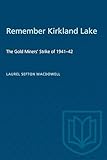Remember Kirkland Lake : 'The Gold Miners' Strike of 1941-42 / Laurel Sefton MacDowell.
Material type: TextSeries: HeritagePublisher: Toronto : University of Toronto Press, [1983]Copyright date: ©1983Description: 1 online resource (308 p.)Content type:
TextSeries: HeritagePublisher: Toronto : University of Toronto Press, [1983]Copyright date: ©1983Description: 1 online resource (308 p.)Content type: - 9780802064578
- 9781487575922
- 331.89/28223422
- HD5329.M732 1941
- online - DeGruyter
| Item type | Current library | Call number | URL | Status | Notes | Barcode | |
|---|---|---|---|---|---|---|---|
 eBook
eBook
|
Biblioteca "Angelicum" Pont. Univ. S.Tommaso d'Aquino Nuvola online | online - DeGruyter (Browse shelf(Opens below)) | Online access | Not for loan (Accesso limitato) | Accesso per gli utenti autorizzati / Access for authorized users | (dgr)9781487575922 |
Browsing Biblioteca "Angelicum" Pont. Univ. S.Tommaso d'Aquino shelves, Shelving location: Nuvola online Close shelf browser (Hides shelf browser)

|

|

|

|

|

|

|
||
| online - DeGruyter Current Law and Social Problems, II / | online - DeGruyter City Politics in Canada / | online - DeGruyter The North-West Mounted Police and Law Enforcement, 1873-1905 / | online - DeGruyter Remember Kirkland Lake : 'The Gold Miners' Strike of 1941-42 / | online - DeGruyter The Poems of Archibald Lampman / | online - DeGruyter Ukrainian Literature in the Twentieth Century : A Reader's Guide / | online - DeGruyter Making Law, Order, and Authority in British Columbia, 1821-1871 / |
restricted access online access with authorization star
http://purl.org/coar/access_right/c_16ec
On 18 November 1941, the gold miners of Kirkland lake struck for union recognition. The Kirkland Lake strike was a bitter struggle between the mine operators and their employees and became a national confrontation between the federal government and the labour movement over the issue of collective bargaining. Locally, the dispute was affected by the company-town environment and by the mine operators' paternalistic view of labour relations. Through the difficult winter womenths, the community -- polarized by the events -- tried to deal with both the 'political' and social impact of the conflict. The author's father, Larry Sefton, emerged as one of the local leaders of the strike, which itself was a training ground for many future trade unionists. The strike was waged in the special circumstances of the war economy, and was a microcosm of wartime developments, which produced unprecedented union growth, serious industrial unrest, hostile management response, and generally antagonistic labour/government relations. Professor MacDowell shows that, even though the strike was lost, its eventual effect on labour policy gave the dispute its particular significance. To win the strike, government intervention and the introduction of collective bargaining were necessary, yet the only intervention was by the Ontario Provincial Police, who were ordered to assist the mining companies to operate with strike-breakers. The federal government refused to intervene, in spire of virtually unanimous support for the strike by the Canadian labour movement. MacDowell confludes that the strike succeeded in unifying organized labour behind the demand for collective-bargaining legislation. It highlighted the inadequacy of the government's wartime labour poilcy, and ultimately forced the government to authorize collective bargaining, first for Crown companies and then for all industrial workers. Thus, the Kirkland Lake strike was not only an important wartime dispute affecting policy development, but it also established a special legacy for trade unionists as part of the history of their movement.
Mode of access: Internet via World Wide Web.
In English.
Description based on online resource; title from PDF title page (publisher's Web site, viewed 01. Nov 2023)


